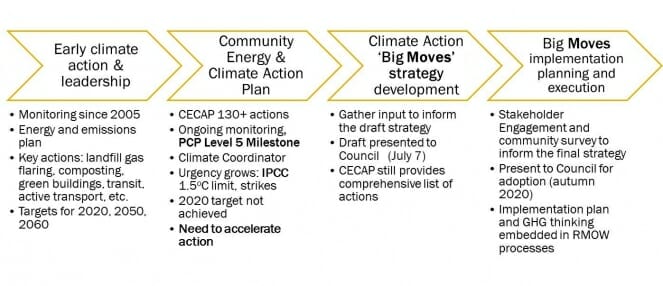
Purpose
This strategy focuses on climate change mitigation priorities that will accelerate climate action in Whistler and achieve significant greenhouse gas (GHG) reductions. It builds on the work of the Community Energy and Climate Action Plan (CECAP) and supports many of the goals, objectives and policies contained in the RMOW’s Official Community Plan (OCP) adopted in June 2020.
Climate change mitigation priorities are articulated by the ‘Big Moves’ and associated key initiatives. In addition, an ambitious reduction target for 2030 commits us to accelerated action. With Whistler unable to meet its 2020 target, and the next target not applying for another 30 years, a closer term target is needed to better assess Whistler’s climate performance and to increase accountability. Successful implementation of this strategy will get us 70% of the way to the 2030 target; therefore, it will need to be expanded in the coming years to close the shortfall, and doing so will require additional support and tools from other levels of government to enable further municipal action.
Background
Whistler showed early leadership on climate as one of the first signatories to the BC Climate Action Charter, then implementing many significant actions such as landfill gas flaring, in-vessel composting, green building policies, and improved transit. In 2016, the municipality developed the Community Energy and Climate Action Plan (CECAP).
With over 130 actions, the CECAP provides a comprehensive list of climate initiatives. It covers mitigation and adaptation measures in a wide variety of sectors and focus areas to ensure Whistler does its fair share to combat climate change and to prepare for the inevitable changes that will occur. More recently, Whistler’s Vision and OCP include a strong commitment to advancing climate action through a number of goals, objectives and policies relating to energy use and climate mitigation, land use, buildings, transportation and more.
Since 2016, the need to address climate change has become even more urgent. A recent Intergovernmental Panel on Climate Change report with new warnings and a more demanding target and timeline has heightened public concern. We are experiencing global climate strikes, and communities around the world are declaring climate emergencies – all indications that the time to act in a very focused, strategic and collaborative way is now.
Climate Big Moves were first introduced by the City of Vancouver and the Community Energy Association (CEA). The goal is to inform and drive significant climate action and set B.C. communities on a trajectory towards a low carbon future. Over the past 2 years, Big Moves have been adopted by an increasing number of local governments across the province to drive GHG reduction.
The need to accelerate Whistler’s climate action is clear, and this Climate Action Big Moves Strategy prioritizes what needs to be done, at a minimum, in our community. The strategy provides the guiding framework to prioritize CECAP actions, incorporate new opportunities, and align the community-wide efforts needed to achieve significant emissions reductions.
Beyond reducing our emissions and mitigating climate change, there are additional benefits to climate action that will help to improve many aspects of life in Whistler and move us closer to the community vision described in the updated OCP. Most importantly, the Big Moves strategy seeks to enhance climate equity and aims to ensure that all of Whistler’s residents can participate in and benefit from the proposed key initiatives.

Partnerships
While the key initiatives within each Big Move speak to the municipality’s role, partnerships and community-wide involvement will be needed to ultimately achieve them. The municipality can encourage, support and sometimes incentivize, but all of Whistler will need to come together to achieve this Climate Action Big Moves strategy. Further, we will need the other levels of government supporting this critical and urgent effort with policies, funding and additional municipal tools.
Key Climate Changes – Whistler Modelling
The RMOW recently contracted BGC Engineering to provide a summary of climate change modelling for Whistler, projecting the key climate changes anticipated over the next 80 years. For more information, please see the summary report here.


